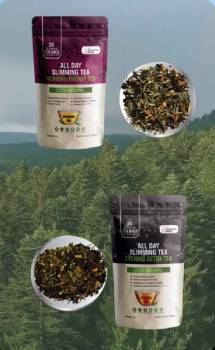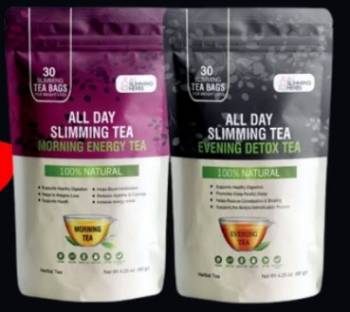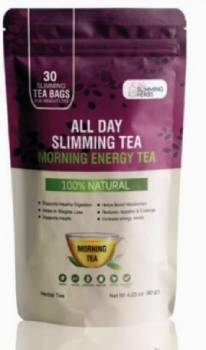With the rise of herbal weight loss teas, many brands claim to offer natural and effective ways to shed pounds effortlessly. Among them, All Slimming Herbs Tea has gained popularity for its bold claims—promising up to 2.9 pounds of weight loss per week, boosting metabolism, reducing bloating, and improving digestion.
The product consists of two types of tea:
- Morning Tea – Supposedly increases energy, reduces appetite, and enhances metabolism.
- Evening Tea – Claims to detox the body, improve sleep, and reduce bloating.
Sounds great, right? But does it actually deliver on these promises? After testing the tea myself and analyzing real customer reviews, the reality is far from what’s advertised. All Slimming Herbs Tea is nothing more than a glorified herbal drink with minimal, if any, weight loss benefits.
Let’s take a deep look into why this tea falls short of expectations and why you should think twice before buying it.

What All Slimming Herbs Tea Claims To Do
The company makes some big promises, including:
- Boosting metabolism and energy levels naturally.
- Suppressing appetite and cravings for weight management.
- Detoxifying the body overnight while promoting deep sleep.
- Reducing bloating and improving digestion.
These claims sound too good to be true, and in my experience, they absolutely are.
My Experience – Does This Tea Actually Work?
1. No Weight Loss After Weeks of Use
I followed the instructions exactly—drinking the Morning Tea and Evening Tea daily for over two weeks. The result? Absolutely no weight loss.
- I did not notice any reduction in appetite or cravings.
- My energy levels remained the same—no noticeable boost.
- My metabolism did not feel any different, nor did my digestion improve.
For a product that claims to help lose almost 3 pounds per week, this was extremely disappointing.
Read More: My Thoughts on Golo vs. Calibrate
2. Misleading Serving Size – Not Enough for Daily Use
The instructions suggest drinking 3-4 cups per day for the best results. However, each bag only includes one morning and one evening tea bag, meaning you don’t get enough tea to follow the recommended usage.
- If you try to reuse a tea bag, the second cup becomes flavorless and weak.
- To follow the recommended dose, you’d need to buy multiple packs, increasing the cost significantly.
This feels like a sneaky way to make customers buy more tea bags, which raises serious doubts about the company’s intentions.
3. The “Detox” Effect Is Just a Laxative Reaction
Like many “detox teas”, the Evening Tea contains Senna leaf—a well-known natural laxative.
- Drinking Senna-based tea before bed may lead to frequent trips to the bathroom, but this is not true detoxification—it’s simply a laxative effect.
- The weight you “lose” is just water weight, not actual fat loss.
Relying on laxatives for weight loss can be harmful in the long run, causing dehydration, digestive issues, and dependence on laxatives for bowel movements.
What Customers Are Saying – Common Complaints
1. No Real Weight Loss
Many customers report seeing no changes in their weight, appetite, or metabolism, even after drinking the tea for several weeks.
“I used the tea for over two weeks morning and evening but didn’t lose any weight or feel any less hungry.”
“It tastes good, but if you’re purchasing this for weight loss, save your money. It does NOT work.”
2. Misleading Product Claims

Customers also call out the misleading marketing—suggesting 3-4 cups per day, but providing only 2 tea bags per day in the package.
“The directions tell you to drink this 3-4 times a day, but they only give you one bag per morning and evening. If you reuse a tea bag, the second brew is flavorless.”
3. More of a Herbal Tea Than a Weight Loss Aid
At best, some customers enjoy the flavor, but don’t notice any weight loss benefits.
“It’s a nice tea to drink, but it’s not doing anything for weight loss.”
If you’re simply looking for a relaxing herbal tea, there are far better and cheaper options out there.
Pros & Cons of All Slimming Herbs Tea
Also Read: Diet Direct vs. Optavia
Pros:
- Pleasant herbal flavor.
- Contains natural ingredients
- May offer mild digestion support.
Cons:
- Does NOT promote weight loss as advertised.
- Misleading serving size—not enough tea bags to follow recommended usage.
- Laxative effect from Senna leaf—not real “detoxification.”
- Expensive for what it is—regular herbal tea with inflated claims.
- No appetite suppression or metabolism boost.
Better Alternatives – What Actually Works?
If you’re looking for a real weight loss tea or metabolism booster, here are better alternatives than All Slimming Herbs Tea:
1. Green Tea Extract Supplements
- Contains high levels of catechins and EGCG, which have been scientifically linked to fat burning.
- More effective and affordable than overpriced herbal teas.
2. Matcha Green Tea Powder
- More potent than regular green tea.
- Boosts metabolism naturally without unnecessary ingredients.
3. Pu-erh Tea

- A fermented tea that has been linked to reducing body fat and improving digestion.
- Unlike detox teas, it does not rely on laxatives for temporary weight loss.
4. Caffeine-Free Herbal Teas for Digestion
- Peppermint or Ginger Tea supports digestion without false weight loss claims.
- Chamomile or Lemon Balm Tea helps with relaxation and sleep.
Final Verdict: Instead of falling for overpriced weight loss teas, go for real metabolism boosters like green tea, matcha, or pu-erh tea.
FAQs About Slimming Teas
Slimming teas often contain ingredients that can have unintended side effects, particularly if used frequently or in large quantities. The most concerning slimming teas are those that include laxatives, such as Senna. Regular use of these laxative-containing teas can lead to several problems:
Dehydration: Laxatives promote bowel movements, which can lead to fluid loss. If fluid intake isn’t sufficient to compensate, dehydration can occur. Symptoms of dehydration include thirst, dizziness, fatigue, and constipation.
Digestive Discomfort: Laxatives can irritate the digestive tract, causing cramping, bloating, diarrhea, and other forms of digestive upset. These side effects can be uncomfortable and disruptive to daily life.
Electrolyte Imbalances: Frequent bowel movements can deplete electrolytes, which are essential minerals that play a crucial role in various bodily functions. Electrolyte imbalances can lead to muscle weakness, heart arrhythmias, and other serious health problems.
Laxative Dependency: Long-term use of laxatives can create a dependency, where the body relies on them for bowel movements. This can make it difficult to have regular bowel movements without the aid of laxatives and can damage the natural function of the digestive system.
It’s important to carefully read the ingredients of any slimming tea before using it. If it contains laxatives, it’s best to avoid it or use it only sparingly and under the guidance of a healthcare professional.
Many herbal weight loss teas claim to promote weight loss, but their effectiveness is often overstated. Most of these teas rely on ingredients that have a diuretic or laxative effect, leading to temporary water loss. While the scale might show a lower number after drinking these teas, this is not true fat loss. Once you rehydrate, the weight will likely return.
For sustainable and healthy weight management, it’s essential to focus on long-term strategies, including:
Healthy Eating: A balanced diet rich in fruits, vegetables, lean protein, and whole grains is crucial for weight management.
Regular Exercise: Physical activity helps burn calories and build muscle, which can boost metabolism and contribute to weight loss.
Metabolism-Boosting Supplements (with caution): Some supplements may claim to boost metabolism, but it’s important to research them carefully and consult with a healthcare professional before taking them. Many “metabolism-boosting” supplements have limited scientific evidence to support their claims.
Weight loss teas can sometimes play a small supporting role in a weight management plan, but they should not be relied upon as a primary solution. Focus on developing healthy habits that you can maintain long-term.
There is no single “top 1” slimming tea that is universally effective. The best tea for you depends on your individual needs and preferences. Instead of focusing on overpriced “slimming teas” that often make unsubstantiated claims, consider these options:
Matcha Green Tea: Matcha is a type of green tea that is high in antioxidants and may help boost metabolism. It also provides a sustained energy boost without the jitters associated with coffee.
Pu-erh Tea: Pu-erh tea is a fermented tea that some studies suggest may help with fat reduction. However, more research is needed to confirm these findings.
Ginger or Peppermint Tea: These herbal teas can aid digestion and reduce bloating, which can contribute to a feeling of lightness and well-being. They are also caffeine-free.
These teas offer potential health benefits without the risks associated with laxative-containing slimming teas. They can be a part of a healthy diet and lifestyle.
Whether it’s okay to drink slimming tea daily depends entirely on the ingredients of the tea.
Natural Herbal Teas: Drinking natural herbal teas like green tea, matcha, ginger, or peppermint tea daily is generally considered safe. These teas offer hydration and may provide some health benefits.
Slimming Teas with Laxatives: Slimming teas that contain laxatives like Senna should not be consumed daily. Regular use can lead to the side effects mentioned earlier, including dehydration, digestive problems, electrolyte imbalances, and laxative dependency.
It’s crucial to distinguish between natural herbal teas and slimming teas that are marketed for weight loss. Always check the ingredient list and avoid teas that contain laxatives or other potentially harmful ingredients. If you have any concerns, consult with a healthcare professional.

Final Thoughts – Is All Slimming Herbs Tea Worth It?
Absolutely not. Despite the bold weight loss claims, this tea does not work as advertised.
- No real weight loss effects.
- Relies on laxatives for temporary results.
- Expensive for a basic herbal tea.
- Misleading serving sizes encourage more purchases.
Instead of wasting money on fake weight loss teas, try real metabolism-boosting options like matcha, green tea, or pu-erh tea.
